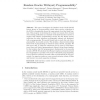84 search results - page 4 / 17 » On the Security Loss in Cryptographic Reductions |
105
click to vote
EUROCRYPT
2001
Springer
15 years 6 months ago
2001
Springer
We formalize the notion of a cryptographic counter, which allows a group of participants to increment and decrement a cryptographic representation of a (hidden) numerical value pri...
112
click to vote
TCC
2009
Springer
16 years 2 months ago
2009
Springer
We study the possibility of constructing encryption schemes secure under messages that are chosen depending on the key k of the encryption scheme itself. We give the following sep...
129
click to vote
COCO
2010
Springer
15 years 2 months ago
2010
Springer
We investigate the question of what languages can be decided efficiently with the help of a recursive collisionfinding oracle. Such an oracle can be used to break collisionresistan...
134
click to vote
ASIACRYPT
2010
Springer
14 years 11 months ago
2010
Springer
This paper investigates the Random Oracle Model (ROM) feature known as programmability, which allows security reductions in the ROM to dynamically choose the range points of an ide...
85
Voted
CRYPTO
2004
Springer
15 years 7 months ago
2004
Springer
Many cryptographic primitives begin with parameter generation, which picks a primitive from a family. Such generation can use public coins (e.g., in the discrete-logarithm-based c...

